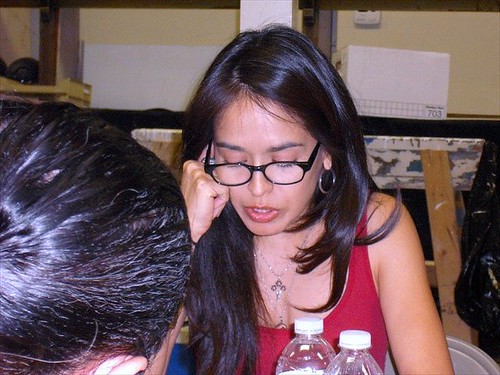A Ukrainian TikTok Influencer Shares Her Life as a Refugee in “Following Valeria”
Valeria #Valeria

When Russian bombs struck Ukraine two years ago, Valeria Shashenok, a twenty-year-old aspiring fashion photographer, took cover with her parents in a basement in Chernihiv, a city north of Kyiv. They waited, restless and anxious, as Russian forces laid siege. In an effort to take her mind off things, Valeria made a series of TikTok videos, including a bomb-shelter riff on the “things that just make sense” trend, in which users share their lives’ mundane absurdities. She documented details of her life in the bunker—preparing meals on a hot plate, making coffee with a blowtorch—and on forays outside she filmed destroyed buildings and blast pits. Valeria channelled her anger into deadpan: an eye roll, a bewildered hand flick, a “what gives” headshake. In the early weeks of the war, Ukrainians found salve in dark absurdist humor. Her videos went viral; one amassed more than twenty million views in just three days. A week later, she decided to leave Ukraine and to join millions of other people fleeing the war.
When the documentarian Nicola Fegg came across Valeria’s videos, she found them “completely charming—and also really weird,” Fegg told me. “I couldn’t understand where her humor was coming from.” With that question, Fegg’s documentary “Following Valeria” was set in motion. Fegg first met Valeria in Warsaw, where Valeria disembarked from a train after two days on the road, tired and dazed but purposeful in cultivating her new social-media role. Fegg then tagged along as Valeria travelled across Europe, finding temporary homes in Berlin, Milan, and a village outside of Nuremberg, all the while continuing to document her life on TikTok. She never lost her sense of wry amusement at the whole situation, at one point comparing her pilgrimage to “Keeping Up with the Kardashians.”
Before the war, Valeria had used her TikTok account to promote herself as a commercial photographer. But soon she was using her social-media fame to take part in the war effort in a small but palpable way, by reaching viewers who watched events from afar. She began promoting a humanitarian organization in Chernihiv, and she was able to send financial help to her uncle, who had been injured in a bombing raid. His son, Valeria’s cousin, had died. Valeria told me that it was her ability to ask strangers for donations for Ukraine and to see funds arrive “at lightning speed” that brought home for her what her new platform might mean. “I was, like, ‘Gee, no way!’ ” she recalled.
Many of the film’s scenes unfold to the rhythm of a speeding train or a rolling suitcase, as Valeria, cell phone in hand, watches the scenery rush by, wanders unfamiliar streets, and joins a pro-Ukraine rally in a public square. She borrows a jacket for a State of the Union address at the European Commission after a special invitation was extended to her and a handful of other social-media personalities; then she picks up food aid and marvels at having scored a whole chicken. Fegg told me that it was “this stretch, between being an influencer and being a refugee” that she found the most interesting as a filmmaker. “It held so much tension that I wanted to portray who she was as a person.”
Valeria was born in 2001, ten years after Ukraine gained independence from Russia, and, until the full-scale invasion, the country’s fraught, volatile politics had given her and her generation a cynical outlook. “To me, politics is a dirty word,” she told me. “But then again, with the war, now anything we touch is politics.” She was clear-eyed about the currents of trauma voyeurism and information warfare that had buoyed her early posts from Chernihiv. “The people who reposted my videos—they were using me to get clicks, but I was using them, too,” she told me. “I realized that I can say serious things, and that I reached people. There were many people who wanted to listen to a young girl and not some serious guy in parliament.”
One telling scene in the film takes place in Germany, where Valeria sits on a bedroom floor struggling to record her answers to a list of interview questions about Ukraine; far from home, she is waging a fight of her own, searching for a voice. She finds it absurd that online trolls accuse her of using the invasion to get famous; she’d rather there never were a war in the first place. One of her favorite historical figures, she told me, is Margaret Thatcher: “They tried to blow her up, but she strode out of the room and went, ‘Hah! Not so fast!’ I just love it. A real woman with balls.” Valeria has since returned to Ukraine, and she is still posting.